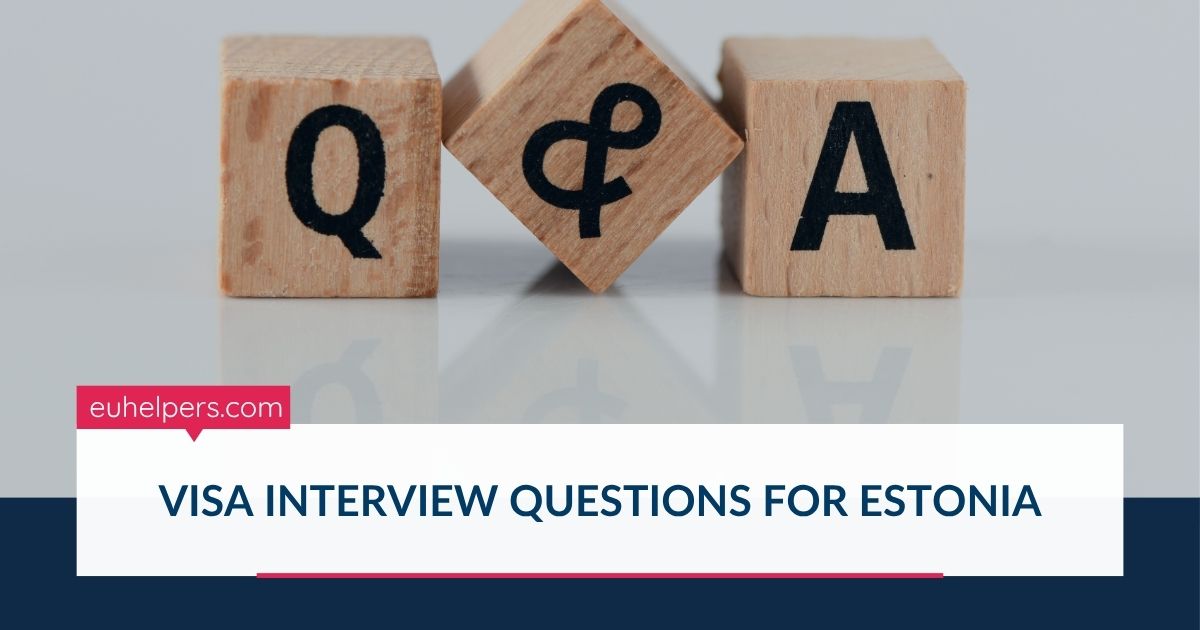
If you're applying for a visa to Estonia—whether for tourism, study, business, or visiting family—you may be required to attend an in-person interview at an Estonian embassy or consulate. This interview is a crucial step in the visa application process, as it allows officials to assess your intentions, financial stability, and likelihood of returning to your home country after your stay.
What to Expect During the Estonia Visa Interview
During your visa interview, a consular officer will ask questions to verify the information in your application and assess your eligibility for a Schengen visa. The focus is on the purpose of your trip, your financial situation, and your ties to your home country.
Common Estonia Visa Interview Questions
1. Purpose of Visit
-
“Why are you traveling to Estonia?”
-
Clearly explain your reason for the trip—whether it’s tourism, business, education, or visiting family. Be specific and concise.
-
2. Travel Itinerary
-
“What are your plans while in Estonia?”
-
“Where will you be staying?”
-
Provide detailed information about your travel plans, including cities you will visit, activities, and accommodation arrangements.
-
3. Financial Situation
-
“How will you fund your stay?”
-
Be ready to show bank statements, employment letters, sponsorship documents, or other proof of financial means.
-
4. Ties to Your Home Country
-
“What guarantees that you will return to your country after your visit?”
-
Mention your job, family, property, or ongoing studies. These demonstrate that you have obligations that will bring you back home.
-
5. Travel History
-
“Have you traveled to other Schengen countries before?”
-
“Have you ever overstayed a visa or had a visa application denied?”
-
Answer truthfully and provide context if needed.
-
6. Accommodation
-
“Where will you stay in Estonia?”
-
“Do you have a hotel booking or invitation from a host?”
-
Present proof such as a hotel reservation or a letter of invitation.
-
7. Return Plans
-
“Do you have a return ticket?”
-
Provide confirmation of a booked return flight, which helps establish your intent to leave Estonia before your visa expires.
-
8. Health Insurance
-
“Do you have travel insurance?”
-
Submit proof of health insurance that covers medical expenses in the Schengen Area, with a minimum coverage of €30,000.
-
9. Family Members in Estonia
-
“Do you have relatives in Estonia or other Schengen countries?”
-
Be honest about any family connections and explain their relation to you.
-
Tips for a Successful Visa Interview
✅ Be Prepared
-
Bring all required documents, neatly organized and ready for presentation.
-
Double-check that your application form, passport, supporting documents, and photos meet official requirements.
✅ Be Honest and Clear
-
Answer questions truthfully and concisely.
-
Avoid giving vague or inconsistent answers that could raise suspicion.
✅ Stay Calm and Polite
-
If you don’t understand a question, politely ask the officer to repeat or clarify.
-
Keep your composure, even if you feel nervous.
✅ Demonstrate Confidence
-
Show that you are well-informed about your travel plans.
-
Confidence in your answers signals that you are credible and have a valid reason for visiting Estonia.
✅ Highlight Ties to Your Home Country
-
Emphasize connections like a job, school, family, or property to prove your intention to return.
✅ Know Your Itinerary
-
Be familiar with the dates, locations, and accommodation of your stay.
-
Being unsure about your plans can be a red flag to the interviewer.
✅ Dress Professionally
-
While formal attire isn’t mandatory, dressing neatly and respectfully leaves a good impression.
The Estonia visa interview is your opportunity to prove your intent to visit Estonia responsibly and return to your home country as required. By preparing thoroughly, staying honest, and demonstrating strong personal and financial ties to your home country, you can significantly improve your chances of a successful visa outcome.
Before your appointment, always check the specific requirements and procedures on the official website of the Estonian embassy or consulate handling your application.
